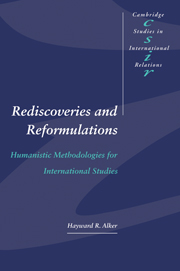Book contents
- Frontmatter
- Contents
- List of figures
- List of tables
- Acknowledgments
- Introduction: Voyages of rediscovery
- Part I Recovering Western antiquity
- Part II The humanistic science of the modern classics
- Part III Contemporary humanistic reformulations
- 8 Fairy tales, tragedies and world histories: Testable structuralist interpretations
- 9 Beneath Tit-for-Tat: The contest of political economy fairy tales within SPD protocols
- 10 Emancipatory empiricism: Toward the renewal of empirical peace research
- 11 The presumption of anarchy in world politics: On recovering the historicity of world society
- 12 The return of practical reason to international theory
- References
- Index
- CAMBRIDGE STUDIES IN INTERNATIONAL RELATIONS
11 - The presumption of anarchy in world politics: On recovering the historicity of world society
Published online by Cambridge University Press: 13 January 2010
- Frontmatter
- Contents
- List of figures
- List of tables
- Acknowledgments
- Introduction: Voyages of rediscovery
- Part I Recovering Western antiquity
- Part II The humanistic science of the modern classics
- Part III Contemporary humanistic reformulations
- 8 Fairy tales, tragedies and world histories: Testable structuralist interpretations
- 9 Beneath Tit-for-Tat: The contest of political economy fairy tales within SPD protocols
- 10 Emancipatory empiricism: Toward the renewal of empirical peace research
- 11 The presumption of anarchy in world politics: On recovering the historicity of world society
- 12 The return of practical reason to international theory
- References
- Index
- CAMBRIDGE STUDIES IN INTERNATIONAL RELATIONS
Summary
There be other names of government, in the histories, and books of policy … For they that are discontented under monarchy, call it tyranny … so also, they which find themselves grieved under a democracy, call it anarchy, which signifies want of government.
Hobbes, Leviathan (1651: Ch. 19)Hedley Bull's World Society Problematique vs. the Cooperation under Anarchy Problematique
I do not agree that “Nations dwell in perpetual anarchy” because “no central authority imposes limits on the pursuit of sovereign interests.” My objection to this hoary, but still fashionable bromide of international relations can be stated in terms of either of “anarchy's” two primary dictionary meanings: (1) a “confused,” “disordered,” “lawless,” “unregulated” state of affairs; and (2) (more technically, but indiscriminately) a state of affairs “without rule, authority or government.” In terms of the first definition the statement is historically incorrect; in terms of the second, its causal argument incorrectly denies the possibilities of order, law and regulation inherent in pluricentric or polyarchic sociopolitical systems. Therefore, I do not think subsequent scholarship should start with these presumptions – both senses of the term “presumption” are intended: “the taking for granted of such a characterization” in scientific research or policy formulation, and the “overstepping of proper bounds” I believe such an unwarranted assumption to be.
The immediate occasion for the development of this argument was the appearance of the October 1985 issue of World Politics, an issue dedicated to the scientific explanation and prescriptive promotion of “Cooperation under Anarchy,” from whose introduction I have just quoted. The presumption that world politics are inherently anarchic is quite explicit and highly visible in this work.
- Type
- Chapter
- Information
- Rediscoveries and ReformulationsHumanistic Methodologies for International Studies, pp. 355 - 393Publisher: Cambridge University PressPrint publication year: 1996
- 2
- Cited by



